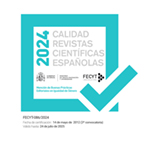Esteve Pinell and the Italian-French influence on female conventual sociability at the begining of the Enlightenment
Abstract
This article analyzes the thought of the ecclesiastical writer Esteve Pinell through his own written works and the translations he made of Italian authors such as Giuseppe Maria Saporiti and Cesare Calino. The debates that the clergy maintained around feminine religiosity in the transition from the Baroque to the Enlightenment, with problems such as the limits of recollection, the advantages or disadvantages of closure and the risks of female sociability within the convents. Pinell represents very well the third way between the excesses of the baroque imaginary and the needs for emotional control to carry out the social, missionary and welfare projection. The influence that figures such as Francisco de Sales, Vicente de Paúl or Juliana Morell had on ecclesiastical discourse and cultural practices is well demonstrated through Pinell’s work
Downloads
Article download
License
In order to support the global exchange of knowledge, the journal Cuadernos de Historia Moderna is allowing unrestricted access to its content as from its publication in this electronic edition, and as such it is an open-access journal. The originals published in this journal are the property of the Complutense University of Madrid and any reproduction thereof in full or in part must cite the source. All content is distributed under a Creative Commons Attribution 4.0 use and distribution licence (CC BY 4.0). This circumstance must be expressly stated in these terms where necessary. You can view the summary and the complete legal text of the licence.












